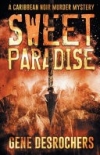Sweet Paradise - Gene Desrochers (ebooks children's books free .TXT) 📗

- Author: Gene Desrochers
Book online «Sweet Paradise - Gene Desrochers (ebooks children's books free .TXT) 📗». Author Gene Desrochers
Probably Puerto Ricans.
Maybe I was part Puerto Rican. I could pass. Curly afro and dark skin, check. Attitude, check. Love of brightly colored clothing and houses, check. Rapid-fire Spanish that no one in any other Spanish-speaking country could understand, uncheck. In reality, I was one-quarter black, although it was tough to tell. I had the bushy hair and I was fairly dark, but more in some other native islander of aboriginal descent way.
Rooting through the discount piles, I found three gallons of cantaloupe. Cheap and attention-grabbing. If someone tried to break into my office, everyone within five-hundred yards would notice the shady character standing in front of the blinding melon door. It would also make it easy to explain how to find my office if anyone ever called for an appointment. Maybe I could use it as a gimmick in future ad campaigns, assuming I ever had an advertising budget again.
Would anyone take a detective with a cantaloupe-colored door seriously? I shrugged, picked up two of the cans, and plopped them next to the register with a hollow metal plonk.
The clerk snorted and wiped the back of her hand across her nose. She had claws for fingernails, featuring faux jewels encrusted on rainbow-colored backgrounds. She clicked expertly on the register using the tips, as if this was the most natural way in the world to type.
She studied the top of one of the paint cans where a bright orange dot denoted the color.
“You know you can’t return these? All sales final.”
I nodded. “Hey, how do you type so good with those nails?”
She gave me a sleepy look. “Don’t know, just I do it.” She squinted at the lid of the can. “You got to buy all three of these cans, da man.”
“I think three is too much, sista,” I said, falling into the lingo. I reverted back. “I’m painting a door.”
“Ain’t no matta what you painting, you got to buy all three.”
Islanders rarely pronounced the “th” in words, so “three” came out as “tree” and “the” came out as “da.” You got used to it pretty quickly so that even the state-siders could eventually understand in most cases. There were a bunch of local dialect words you pieced together over the years. From growing up here, I naturally reverted when speaking to other locals, however, I’d also spent half my life living in the continental United States, so standard North American English was no problem either. Since I’d only been back for six months, standard American felt more natural. Speaking in the accent made me feel different. Sometimes it made me feel I belonged. Other times, I felt like a phony; an actor in my own life.
This woman wasn’t going to budge on the house rules. If the lid said I had to buy all three, then I had to buy all three. Even at that, the cost was about one-third of one new can. On the bright side, I’d have a surplus to keep my door freshly painted at all times. I was going to need that extra paint to cover up the blood.
THE FIRST COAT WAS drying. More droplets of sweat rivered between my shoulder blades as I slugged water and Guinness alternately. Two in the afternoon was no time to be painting in the October heat, but I didn’t know what else to do and sitting around worrying about my looming penury seemed pointless.
The used old-timey clock radio I’d picked up at Bob’s Store babbled on about hurricane warnings as reception fizzled in and out. It was the latter part of hurricane season, and we’d seen minimal storm damage in the region. We might dodge hurricanes for one or two years running, but it was never long enough to truly become complacent about them the way places like New Orleans had.
The overhead fan whirred. Outside my door sunlight filtered thinly through a cloud, illuminating the traffic circle a faint ocher. As I considered the faded lines denoting parking spaces and the cracked pavement, a young man bobbed into my line of sight. He was one of those people who walked on his toes at all times, as if the tendons in his calves were so tight his heels couldn’t touch the ground for more than an instant before popping up again. He squinted at the building, turning his head back and forth, then perused the sheet of paper clutched in both hands. A green Osprey backpack hung loosely off his shoulders. People in California used them for hiking. He tugged at the built-in sippy straw and sucked. The bubbly slurping of the last drops of water in his pouch filtered up to me. Disappointment clouded his face.
His attention snagged on my door. I grinned and gave myself a mental pat on the back. He shifted one hand to his hip and gave a slight lean. I wasn’t sure whether I should let him see me in my ratty painting outfit, but figured that could be explained by the wet door. A spooge of cantaloupe paint dominated the center of my gray t-shirt. I eased the door open a couple more feet.
“Help you?” I asked. “You look lost.”
“Nice door.” He pointed at his forehead and swirled his finger around. “You got some.”
He was college-aged and his face was sunburned, as were his arms. He wore a Hawaiian shirt and khaki pants, a classic tourist outfit.
He continued to stand in the same spot, squinting and considering the sheet of paper. I returned to my inner office, needing another sip of water and the breeze from the fan. Out my open doorway, I could barely make out the top of his Caesar-style haircut.
“You should get a hat!” I hollered out.
His head rose up from the paper and he pushed up on tip-toes so I could see his eyes. “The sun’s doing a number on you,” I said. “Want a drink of water?”
He stared at me a while with a strange stillness, like





Comments (0)